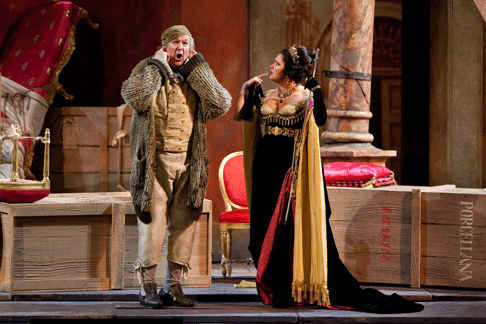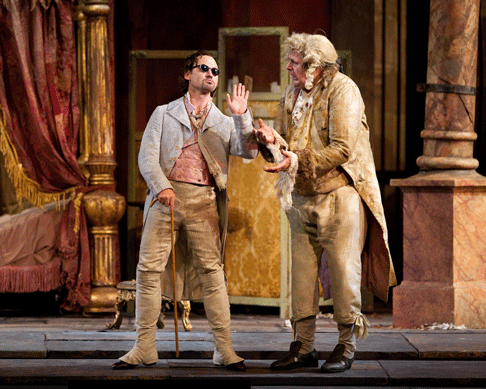He was 47,
managing opera houses in Vienna and Paris, introducing new talents like Verdi,
and could still turn out melodies to beat the band—so to speak—with
ever more of a nod to tight scripts and psychological subtleties. With Rossini
in retirement, Bellini dead, Verdi a tyro and Mercadante about to withdraw into
academe, Donizetti was the most popular Italian composer in the world. Who
knows where this would have led him had his career gone on (as Verdi’s,
Mercadante’s, Pacini’s, Meyerbeer’s, Auber’s all did)
till he was 65? Would he have composed operas for St. Petersburg, Berlin,
London and New York? Can we doubt it?
Given the proper performers (Donizetti’s operas, even more than most,
depend on the performer to put them over), Don Pasquale remains almost
irresistible. The Met has had great success with Otto Schenk’s moderately
updated production (O’Hearn-Merrill’s was better, funnier,
lighter), and it is clear from last Friday’s performance that the
touch-ups required for last fall’s HDTV movie theater broadcast have made
it more stage-ready than ever. James Levine, in the pit, seemed especially to
enjoy himself but the entire cast is infectiously frolicsome.
I had quibbles, however, with some of the singers: all good, but some a
little graceless in their approach to this pearl-icing confection. Anna
Netrebko is a prima donna, and her voice has gotten steadily larger and thicker
while losing a top note or two. This makes her a good candidate for Anna
Bolena, for example, a Donizetti role she is singing in its Met premiere next
season, and even likelier as Bellini’s Sonnambula or Giulietta, in both
of which roles she has been broadcast from Vienna. But the voice’s
thickness, its inability to lighten up, is uncomfortable in a Norina. The lady
must be laughing all the time, or we are disinclined to forgive her rather
calculated assault on the wealth of the title character. Reri Grist, my first
Met Norina, floated about the stage, almost pirouetting around a lovably
flummoxed Fernando Corena, and the instant of her slap, the moment when she
goes too far and knows it, was an instant transformation not merely in the
music but in her attitude, as she pulled her hands to her cheeks in horror at
what she’d done, and a genuine personality was displayed—as also
affection for the old man. Netrebko can no longer manage that lightness, that
speediness, and she cannot manage the top notes of her runs, which rise
prettily only to stop short every time. (What is that note? D? She hasn’t
even got a D?) The glittering final waltz did not glitter or twirl; Netrebko
offered it … dutifully. Ljuba Petrova, who sang one performance of the
opera here during the present production’s first season, was rather more
what we are looking for: Not a dramatic prima donna but an old-fashioned canary
coloratura whose charm and wit match her voice. And she had all the high
notes!
 John Del Carlo as the title role and Anna Netrebko as Norina
John Del Carlo as the title role and Anna Netrebko as Norina
Ernesto was sung by Barry Banks, whose voice has also changed over the
years, from the spectacular instrument of the Flute/Thisbe in the Met’s
Midsummer Night’s Dream and the heroic Oreste in Ermione that amazed New
York. His legato line no longer flows comfortably; it is a tolerable but
charmless substitute for the proper tenor elegance.
Buffo basses can get by for years with far less voice than John Del Carlo
still possesses. He wittily deploys his great height and bulk and mugs in the
very finest fettle. You can’t have Don Pasquale without a Pasquale, and
the Met is right to hang on to this one.
The star of the show for dapper farce-performance, suave vocalism and
bring-down-the-house sex appeal was Mariusz Kwiecien as Dr. Malatesta. There is
nothing to object to in his singing (he doesn’t scream in this opera, as
he tends to in Lucia or L’Italiana) or his scampering or his appeal,
except that this is Dr. Malatesta and the opera is called Don Pasquale and the
lovers are Ernesto and Norina. Why is the doctor the one we wait for, listen
to, watch on stage? Most Malatestas “feed” their Norinas (without
picking them up and tossing them about like throw pillows), accompany their
Pasquales, take a line in the concerted passages. The character is a catalyst,
not the focus of the opera, but Otto Schenk has got nothing so wrong as
building this character up. If Malatesta is the center of attention, and has
such a rich relationship with Norina … why do we need the tenor at all?
He fades into the woodwork if Malatesta does not.
 Mariusz Kwiecien as Dr. Malatesta and John Del Carlo in the title role
Mariusz Kwiecien as Dr. Malatesta and John Del Carlo in the title role
But all these objections seemed to occur to few others in the audience last
Friday, who all seemed to be tickled that they were having such fun, enjoying
such a sparkling score in such an animated, Broadway-worthy performance,
without having to drop a tear or think a thought at all. And isn’t that
the sort of pleasure farce is supposed to provide?
John Yohalem


